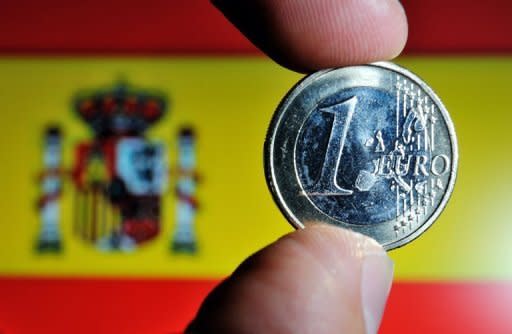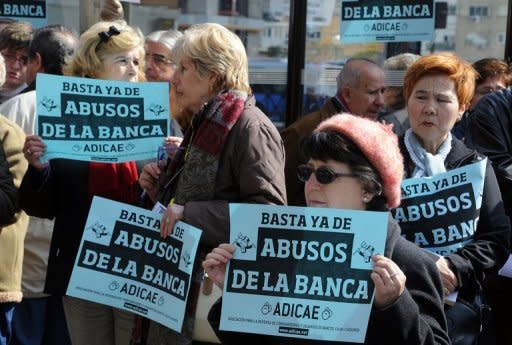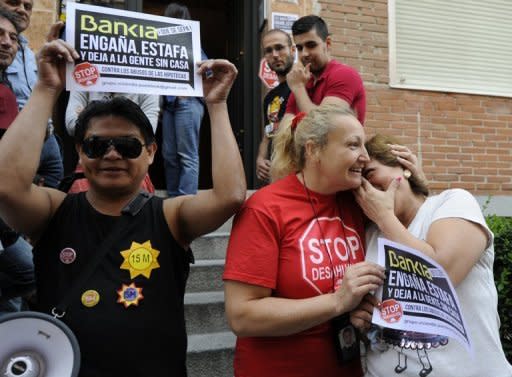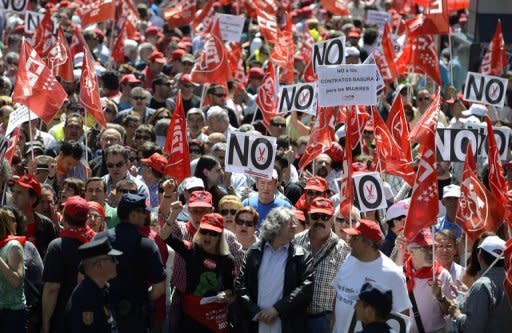Investors flee Spain as financial crisis spirals
Spain battled to contain fears of financial collapse Wednesday, scrambling to fund a major banking rescue as its debt risk premium rocketed to a euro-era record. The interest rate on Spain's 10-year bonds shot to 6.703 percent -- unsustainable over the longer term -- as the nation fought to avoid being the next victim of the eurozone crisis. When compared to safe German debt, investors in Spanish bonds were demanding an additional 5.41 percentage points, a premium that easily crashed through euro-era records set each day of this week. Stock prices skidded across the world and Madrid's IBEX-35 index tumbled 2.58 percent to a nine-year low 6,090.4 points, with stricken lender Bankia diving 8.6 percent. The European single currency plunged at one point to $1.2389 -- a low point last seen in July 2010, before recovering somewhat to just above $1.24. Bank of Spain governor Miguel Fernandez Ordonez, who surprised investors by announcing he would depart June 10, a month before his term was due to end, warned that trust in Spain had been shaken. "Nothing is more important now than regaining confidence because without that we cannot resolve any of our problems," said Ordonez, who explained he was leaving early to give his successor time to take the reins. But the central bank chief also said there were risks to Spain's plan to slash the public deficit from 8.9 percent of economic output last year to 5.3 percent this year and 3.0 percent in 2013. In a recession with 24.4 percent unemployment, the state faces "downward risks" to its revenue forecasts and the threat of higher-than-expected expenses, for example for unemployment benefits, he warned. "It is not an exaggeration to say that Spain is staking a great part of its future on achieving these fiscal targets," he told the Senate. In Brussels, Economic Affairs Commissioner Olli Rehn said that if Spain reined in regional government deficits and presented a "solid" two-year budget, then the deficit deadline could be extended to 2014. Spanish banks, hugely exposed to a property market that crashed in 2008, are at the heart of market concerns. Prime Minister Mariano Rajoy's conservative government this month instructed banks to set aside 30 billion euros in 2012 in case property-related loans go bad, on top of 53.8 billion euros demanded under February reforms. Hardest hit lender Bankia has asked the government for 19 billion euros in capital in addition to 4.465 billion euros invested by the state earlier this month to salvage its books. But no-one seems to be clear about where the money will come from, especially when debt markets are charging exorbitant sums to lend to Spain. "Some sort of attempt to rescue Spain is likely and it is likely to come in July," said Barcelona-based economist Edward Hugh. Spain would attempt to cling on until Greek elections were over and the European Stability Mechanism, a permanent rescue fund, was operational, he predicted. The cost of recapitalising the banks would be 150-200 billion euros, he estimated, assuming that lenders were obliged to make additional provisions for home mortgages. Economy Minister Luis De Guindos said the state-backed Fund for Orderly Bank Restructuring (FROB) would issue bonds to raise capital, which it could then inject into Bankia. He denied a Financial Times report that the European Central Bank had rejected a tentative Spanish plan to inject government bonds into Bankia, which could then use them as collateral to borrow from the ECB. The ECB also issued a statement denying it had taken a position or been consulted on the scheme. But the government failed to quash the concerns over Spain's financial sector. Centre-right daily El Mundo this week said three other banks, CatalunyaCaixa, NovacaixaGalicia and Banco de Valencia, could need another 30 billion euros in public funds to meet new regulations. Yet another lender, Banco Popular, whose bonds have been downgraded to junk bond-status, said this week it was in talks to sell its Internet banking business in a scramble for cash.





